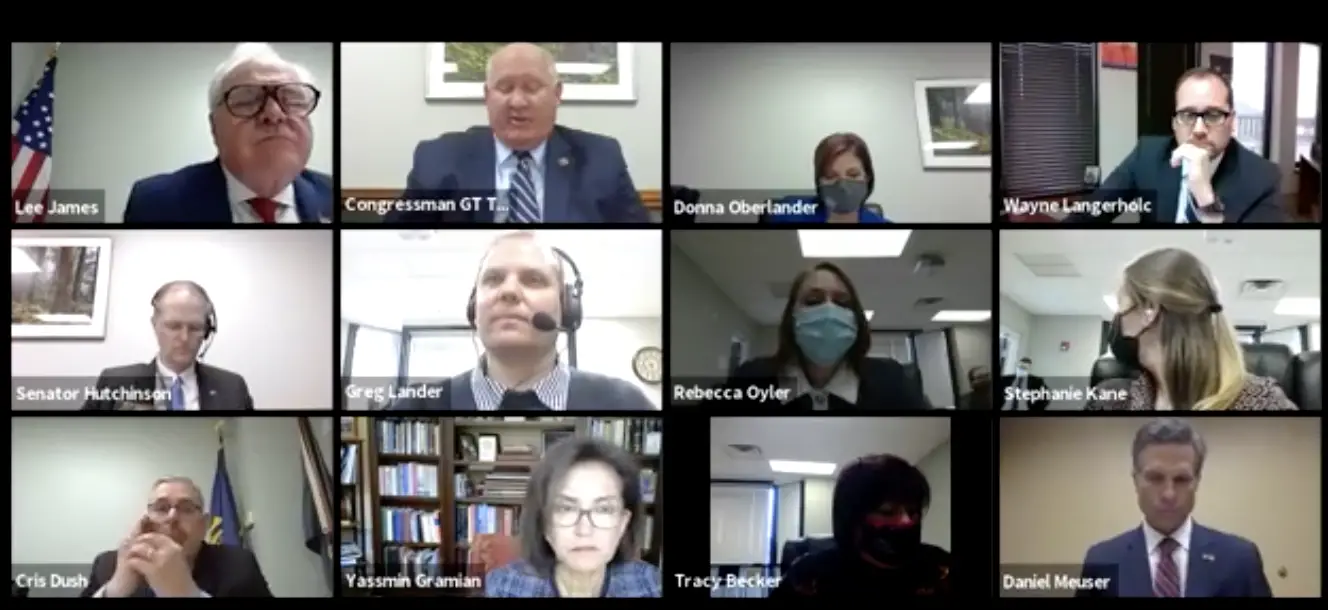 CLARION, Pa. (EYT) – On Thursday, U.S. Representative Glenn “GT” Thompson hosted a field hearing of a working group of Congressional and Pennsylvania State Legislators at the Clarion County Administrative Building to examine the Pennsylvania Department of Transportation’s Major Bridge Tolling Proposal.
CLARION, Pa. (EYT) – On Thursday, U.S. Representative Glenn “GT” Thompson hosted a field hearing of a working group of Congressional and Pennsylvania State Legislators at the Clarion County Administrative Building to examine the Pennsylvania Department of Transportation’s Major Bridge Tolling Proposal.
The panel included Rep. Thompson, State Rep. Donna Oberlander (R-63rd District), State Rep. R. Lee James (R-64th District), State Senator Scott Hutchinson (R-21st District), and State Senator Cris Dush (R-25th District), Executive Director Tracy Becker of the Clarion Area Chamber of Business & Industry, along with other representatives and stakeholders in the project.
The Bridge Tolling Proposal itself was announced in February as part of the PennDOT Pathways Major Bridge Public-Private Partnership (P3) Initiative.
According to the state, an alternative funding Planning and Environmental Linkages (PEL) study found that tolling of major bridges in need of replacement or rehabilitation appears to be a viable near-term solution. To advance the tolling-based funding alternative, PennDOT is now pursuing the first initiative of the PennDOT Pathways Program: The Major Bridge P3 Initiative.
The Pennsylvania P3 Board approved the Major Bridge P3 Initiative on November 12, 2020, which allows PennDOT to use the P3 delivery model for major bridges in need of rehabilitation or replacement, and to consider alternative funding methods for these locations, which include the I-80 Canoe Creek Bridge in Clarion County and the I-80 North Fork Bridges Project in Jefferson County.
The hearing began with an opening statement from PennDOT’s Secretary Yassmin Gramian.
“This project also ensures that all users, whether local or through traffic, contribute fairly to the replacement or rehabilitation of the bridges based on the usage while their fuel tax dollars go toward other improvements,” Gramian stated.
Gramian also noted that along with public input periods, PennDOT is required to conduct public outreach for each of the locations, with emphasis on economic impacts, as well as direct and indirect impacts of potential traffic diversion from toll sites.
Following Gramian’s initial statement, she was unable to stay on the Zoom call for the remainder of the meeting due to a cabinet meeting, which did not sit well with Rep. Thompson.
“Quite frankly, I’m disappointed that the governor doesn’t recognize the importance of this discussion, to be able to get clarifications directly from you, and quite frankly for you to be able to hear directly from the communities and the different stakeholders here.”
After Gramian’s withdrawal from the meeting, the other panelists went on to discuss everything from financial and business concerns to serious traffic concerns.
Concerns over the rollout of the plan were also a topic of discussion, with Senator Scott Hutchinson stating there was “a complete lack of transparency” in the way the P3 board rolled out the initial proposal with no specific dollar amount or bridges.
Rebecca Oyler, president and CEO of the Pennsylvania Motor Trucking Association, noted that Pennsylvania is already the third most expensive state to operate a truck, and tolling major bridges would hurt the trucking industry here.
“It is a tax that further contributes to making Pennsylvania’s trucking industry uncompetitive and set it up for failure,” Oyler said.
Tracy Becker, Executive Director of the Clarion Area Chamber of Business & Industry, also cited concerns about local businesses as well as possible traffic issues that could be created by trucks diverting around the bridges.
“When you have that going on, you don’t have the locals wanting to drive into your community because they don’t want to fight with truck traffic.”
Becker noted that if increased truck traffic begins to keep away other drivers, it could cause further negative impacts for local businesses.
“We all know that it will create a diversion, and it will create congestion,” Rep. Donna Oberlander noted.
“It would choke off our local businesses,” Sen. Dush added.
Rep. James expressed similar concerns.
“Everybody here believes that it is inevitable that traffic will be rerouted,” James noted.
“Can we get to the bottom of what the cost is going to be to roll more trucks and more traffic, such as what we drove through here today, on the communities through which these vehicles are rolling? Are we going to set aside funds to help them pay that?”
Despite the many concerns voiced, Rep. Thompson ended the meeting on a positive note.
“I believe this meeting was productive and gave us good information to digest to come back to the table and find viable solutions that work for Pennsylvanians and address our transportation infrastructure funding issues.”
Copyright © 2024 EYT Media Group, Inc. All rights reserved. Any copying, redistribution or retransmission of the contents of this service without the express written consent of EYT Media Group, Inc. is expressly prohibited.








